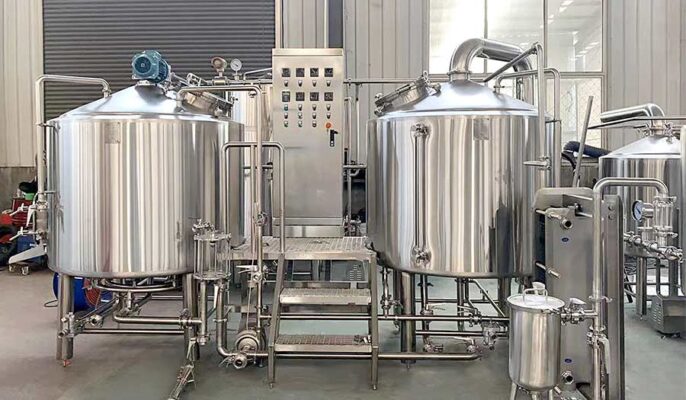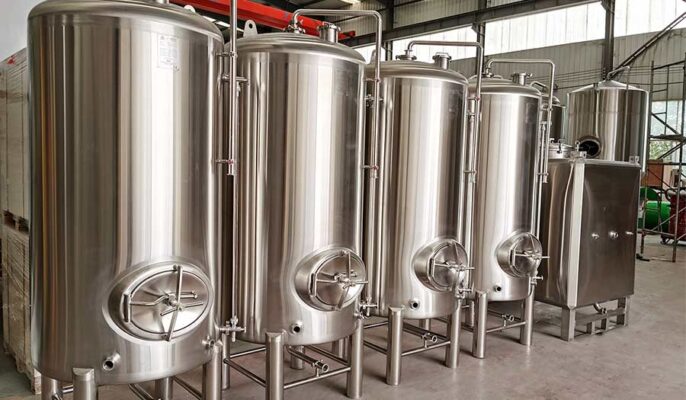Craft beer brewing equipment is the key to making great-tasting beer, and whether you’re a beginner or an experienced brewer, having the right craft brewing equipment will help you better produce high-quality craft beer. This guide will go over the types of craft beer brewing equipment to help you better understand choosing the right craft beer equipment for your needs.
What is craft beer brewing equipment?
Craft beer brewing equipment is a collective term for the tools and equipment used to produce craft beer. The process begins with ingredients such as barley, hops, water, and yeast and ends with the bottling or kegging of the final product. The quality, flavor, and overall character of the beverage depend greatly on the equipment used and the brewing methods employed. This equipment encompasses a wide range of tools used for beer brewing, from simple home brewing setups to large, specialized brewery equipment.
Basic components of craft beer equipment:
- Milling Equipment: used to pulverize grains, ensuring the outer shell remains intact while the interior is finely crushed.
- Wort Tank: a vessel in which the crushed grains are mixed with water and heated. This process converts the starch in the grain into sugar.
- Boiling Pot: After mash, the liquid is moved to the boiling pot and boiled with hops to add flavor and aroma to the beer.
- Fermenter: After boiling, the liquid is cooled and transferred to the fermenter where the yeast is added. The yeast consumes sugar and produces alcohol and carbonation.
- Bright tank: After fermentation, the beer is transferred to the sake tanks where it is clarified and carbonated before being packaged.

What are the types of craft beer brewing equipment?
Home Brewing Equipment
Home brewing equipment is compact, and home brewing kits are a great option for people who want to try brewing beer at home. These kits usually include equipment such as brewing guides, fermentation vats, and malt extraction units, making it easy for people to conduct small-scale brewing experiments at home.
Fermenters: in addition to brewing kits, home brewers can purchase small fermenters for small-scale fermentation experiments at home. These fermenters usually have a smaller capacity and are suitable for experimentation and innovation at home.
Traditional craft brewing equipment
- Brewing Kegs: Traditional brewing kegs are a common type of brewing equipment, which is usually made of wood or stainless steel. These barrels can ferment beer and give it a unique flavor.
- Fermenter: Fermenters are vessels used to ferment beer and are usually made of stainless steel. They are impermeable and corrosion-resistant and ensure that the beer is kept in good hygienic conditions during the fermentation process.
- Boiling pots: Boiling pots are devices used to boil beer ingredients, they are usually made of stainless steel or copper. The size and shape of the boiling pot affect the boiling process and flavor of the beer.
Whole Grain Brewing Equipment
All-wheat brewing allows the brewer to better control the flavor of the beer. It requires more advanced equipment.
- Mash tun: used to mix milled grains and water to promote the conversion of starch to sugar.
- Lauter Tun: helps separate the liquid wort from the hulls.
Modern Brewing Equipment
- Stainless Steel Fermenters: Modern craft breweries often utilize stainless steel fermenters because they are easy to clean and maintain, and they allow for temperature and pressure control to ensure consistent beer quality.
- Chillers: Chillers are devices used to cool down the boiled beer ingredients. They can be air or water-cooled to quickly cool the ingredients down to a temperature suitable for fermentation.
- Automated control systems: Some modern craft breweries are also equipped with automated control systems that monitor and control the brewing process through computers or smart devices to ensure the quality and consistency of the beer.
How much does craft beer brewing equipment cost?
There are various factors to consider when determining the cost of brewing equipment. The size, type, brand, and features of the equipment can have a significant impact on the price.
- Equipment type: The brewing process involves multiple stages, each of which requires different equipment. For example, the cost of a fermenter is different from the cost of a wort bucket.
- Features and technology: Equipment with advanced features, automation, and cutting-edge technology will naturally be more expensive than basic models.
- Extra costs: Installation, maintenance, and potential upgrades are additional costs to consider when budgeting for brewing equipment.
- Brand Influence: Like any other product, the brand name usually determines the price of brewing equipment. Well-known brands known for quality and durability tend to be more expensive than lesser-known brands.
- Size and scale: Homebrewing equipment for brewing beer is much cheaper than commercial equipment.
Price range of craft beer brewing equipment:
|
EQUIPMENT TYPE |
BRAND |
PRICE RANGE (USD) |
|
Homebrewing Kit |
Brewer’s Best |
$50 – $200 |
|
Mash Tun (Small) |
Ss BrewTech |
$200 – $800 |
|
Fermentation Tank |
Blichmann |
$300 – $2,000 |
Uses of craft beer brewing equipment
Beverage Dispensers
These kegs aren’t just for beer. Consider putting your favorite beverages on tap. If you have a dual keg system, you’ll have more beverage options on hand. This is a great idea for parties or special occasions when you want to dispense a large number of drinks conveniently. You can even use water buckets as water or beverage coolers. You can also make your carbonated drinks if you have a CO2 system. You can purchase soft drink extracts. When combined with carbonated water, they will create your homemade soda for all to enjoy.
Iced Tea Brewing
Beer isn’t the only beverage that can be brewed with brewing equipment. Consider making tons of delicious, fresh iced tea. You’ll have enough equipment on hand to make enough iced tea for everyone to enjoy. Your brew kettle can hold and dispense the tea, and you can use a burner to heat the water.
Thermometers
Even some of the smaller brewing items have multiple uses. Thermometers used for brewing beer can also be used to test the temperature of other items. Brewing thermometers have an advantage over other thermometers because they are usually of high quality. You can use thermometers to test the temperature of meat on the grill or to make candy.

Specifications of craft beer brewing equipment
- Single tank brewing: This means that the four steps of brewhouse, wort filtration, boiling, and whirlpooling are completed in one tank. We usually call it a one-piece brewer.
- 2 vesselBrewer: Most dual tank brewers have one tank for brewhouse and filtration, and another tank for boiling and whirlpooling. It is also possible to saccharify, boil, and whirlpool in one tank and filter in the other. Two-tank brewers are a popular choice for many bars and restaurants on the market because they take up less space and are inexpensive.
- 3 vesselBrewers: There are many options for triple tank brewers, the common ones are saccharification and filtration tank + boil pot + whirlpool tank, and saccharification tank + filtration tank + boil pot whirlpool tank.
- COMBO 3 TANK BREWERS: A combo 3-tank brewer is a compromise between a 2-tank and a 3-tank. Because one of the tanks is stacked on top of the other, it is the area occupied by the two tanks. However, there are generally two design combinations that can function as a 3-tank.
How to choose craft beer brewing equipment?
Whether it’s a home hobby or a commercial enterprise, choosing the right brewing equipment is critical to the success of your brewing endeavors.
- Determine size: The first step is to determine the size of your planned brew. Homebrewers may need equipment that can handle 5-10 gallons, while commercial breweries may need systems that can manage hundreds or thousands of gallons.
- Budget: Investments in brewing equipment can range from a few dollars to millions of dollars. Set a clear budget that takes into account not only the initial purchase but also maintenance, upgrades, and potential expansion.
- Research Brands and Reviews: Multiple brands manufacture brewing equipment, each with its pros and cons. Conduct thorough research, read reviews, and even visit some local breweries to see the equipment in action.
- features and technology: modern brewing equipment can be equipped with a range of features – automated controls, digital displays, built-in cleaning systems, and more. Determine which features are essential for your style of brewing and which can be dispensed with.
- Materials and Build Quality: Brewing equipment, especially commercial equipment, should be sturdy and durable. Stainless steel is preferred because it resists corrosion, is easy to clean, and lasts a long time.
- Space considerations: Ensure there is enough space to place and operate brewing equipment. Consider aspects such as ventilation, drainage, and accessibility.
Getting a turnkey solution for craft brewery equipment
If you’re planning to open or expand a craft brewery, you can contact Micet Group directly, and we’ll build the brewery equipment you want for your brewing process, providing you with a customized solution.




